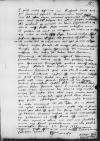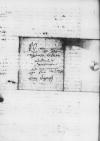Respondi litteris tuis per ⌊canonicum quendam Warmiensem⌋
, verum quia nunc sese offert tanta nuntiorum oportunitas, non potui superinscribed⌈potuipotui superinscribed⌉ omittere, quin iterum scriberem superinscribed in place of crossed-out o⌈oeremerem superinscribed in place of crossed-out o⌉. Haereo hic adhuc propter infaustam illam pensionem, cuius memini in litteris superioribus, cuius utinam numquam fuisset facta mentio. Rediissem enim iam pridem ad meos et non cogerer hic videre et audire, quae video et audio. Quamquam fugio hominum consortia, quantum possum, tamen effugere non penitus non possum. Et ut on the margin⌈utut on the margin⌉ non multis his de rebus nunc tecum agam, ex uno collige reliqua. Impio furioso illi Verpio ⌊Aleandro Mattensi(!)⌋ commissa sunt negotia ⌊Germaniae⌋ hoc nomine bis infelicis. Hic iactat se habere librum secretorum ⌊Germaniae⌋ et tantum non magnus Germaniae cancellarius haberi vult; hic quattuor habet per Germaniam evangelista written over i⌈iaa written over i⌉s, quibus tamquam columnis nititur, ⌊Fabrum⌋, ⌊Eccium⌋, ⌊Cochleum⌋ et nuper exortum ⌊Nauseam⌋, homines quos certe scio h malle tres novos Lutheros exsistere quam unum hunc resipiscere. Quod quare scribam, tu, qui ingenia singulorum probe nosti, non ignoras. Edita ms. Editus(!)
⌈EditaEdita ms. Editus(!)
⌉ est hic ⌊Romae⌋ diebus superiotribus ⌊⌋, plane fabro ferrario digna; si nancisci potuero, mittam. Interim huiusmodi hic placent idque consilio ⌊Verpii⌋. Ego misere hinc abire cupio, metuo tamen, ne me rei indignitas cogat semel libere dicere quae sentio. ⌊Philippus⌋ videtur valde tractabilis, et ratio revocandi non solum illum superinscribed in place of crossed-out ipsum⌈ipsumillumillum superinscribed in place of crossed-out ipsum⌉, sed et ⌊Martinum⌋ ipsum certissima inveniri posset, idque cum gratia, verum per alios quam quos hic ⌊Romae⌋ video, ubi tanta est Litterarum Sacrarum inscitia et tantum veteris inscitiae patrocinium, ut nusquam fuerit umquam maius. Si istic apud te essem, nec papa nec cardinales omnes me ⌊Romam⌋ pertraherent. Vale, Praesul ornatissime.


 AAWO, AB, D. 6, f. 12v
AAWO, AB, D. 6, f. 12v